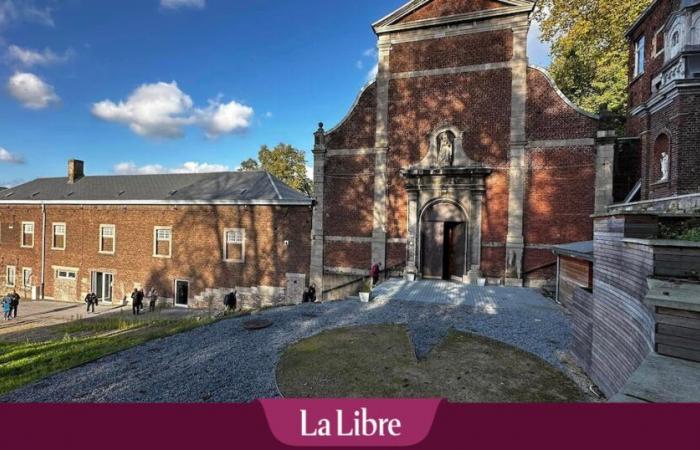To do this, the non-profit organization “Pôle. Blocry”, set up for the occasion, will construct a set of five buildings. These will house the parish premises and will bring together a shared accommodation for young people, two families and apartments for three pensioners. This intergenerational group of fifteen people will therefore lead the parish community and oversee various social and cultural projects aimed at the poor neighborhoods of the commune, migrants and a humanitarian project located in Mozambique.
Number of priests, faithful, baptisms… the Catholic Church presents declining statistics, but is not discouraged
The wish of the non-profit organization is that the Blocry bell tower and the grouped housing built at its feet become “a center of spiritual and Christian influence, parish, community, intergenerational, ecological and open to reception”. “It would be a new way of living the parish, no longer centered solely on the priest, but on a fraternal community.”
However, there are still steps to do this, including the need to find a million euros to be able to request help from the banks. Supported by the King Baudouin Foundation and the Archbishopric of Mechelen-Brussels which agreed to the project, the non-profit organization is therefore soliciting donations (info: [email protected]).
The network of parishes
The initiative is not anecdotal. In its own way, it testifies to a progressive evolution of the Catholic Church in Belgium. For several centuries, it was organized around a tight geographical network of parishes. The 21st Catholic century is heir to this organization. The institution is also trying to maintain it as best it can. However, due to a lack of vocations and invested faithful, the exercise is increasingly complicated. When he took office in June 2023, the young archbishop of Mechelen-Brussels, Luc Terlinden, recognized him among The Free. The Church “cannot trash the principle of parishes and their territorial presence”he insisted. This one “allows us to have a church available and open to all.” However, “we will no longer be able to maintain the grid as we know it. We will evolve towards poles from which we can radiate. But there is no pre-established plan. The reflection will be developed with local communities and cannot fall from above.”
Luc Terlinden, new primate of Belgium: “For Catholics, the problem is not that they are few in number, but that they are insignificant”
The Blocry group housing responds to this call: a group of lay people would take charge of a welcoming, spiritual center concerned with developing social projects. “As in the time of Francis of Assisi, the Church is invited to be reborn from the base, from small fraternal communities.writes Charles Delhez to present his project. “We have moved from Christianity where the Church towered above society to a Church of households.” The geographical network would be less tight than in the past (not all bell towers could be supported by a residential community), but built around homes that the Church hopes will be lively and attractive.
Contemporary expectations
The “Pôle Blocry” will not be the first grouped housing of this kind. “If we define Christian group housing as a group of families living together and living in the same place, there are around ten of them in Belgium. And some are several decades old.evaluates David Abeels who lived in such a habitat (at the “Colline de Penuel” in Mont-Saint-Guibert), and organized at UCLouvain, in April 2023, a day around Christian group habitats which brought together 170 participants. “It is therefore a marginal phenomenon but not trivial, because it responds to contemporary aspirations and issues.he emphasizes.
The future of the Church in Belgium is a formidable unknown: “We are never safe from a surprise”
In view of the desire of Catholics to find “spiritual oases” in the face of the impoverishment of parishes, to taste community life in an “individualist” world, to invest in an “evangelical” project in the wake of the Pope’s appeals Francis in favor of a more sober and fraternal way of life, David Abeels meets many people who wish to integrate such housing projects. “What is missing are personalities capable of initiating them.” Many therefore do not succeed, while some disappear to make way for others.
The challenge of opening
Such initiatives sometimes raise questions. In recent years in France, grouped housing projects have been criticized for the risk of inter-community or communitarianism that they could generate. “There is no theoretical answer to this issue. It’s all a question of the slider to be adjusted on a daily basis”answers David Abeels. “However, I don’t think it’s such a bad thing to be among Christians. And I see that many young people who have kept the faith have been close or distant to places of community and sharing. The essential thing, as is the case in Belgium, is therefore to maintain a form of relationship with the world and the rest of the Church: working outside, welcoming, supporting the neighboring parish…” At Blocry, the objective is not to live alone, but to energize a welcoming place open to contemporary challenges, underlines Charles Delhez.
Several years later, David Abeels keeps the memory of his experience in such a habitat as a demanding but very rich fraternal and individual experience. As for their role in the future, “no one believes they will save the Church single-handedly. They will rub shoulders other initiatives that are both innovative, spiritual and anchored in the tradition of the Church. These initiatives will form a network of spiritual centers of various colors, complementary to the parishes and monasteries which will continue.”
“I think the Pope’s speech has percolated”: behind institutional constraints, the Church is seeing the birth of small “start-ups”
The return of beguinages?
From the end of the 12th century, mainly in the cities of the old Netherlands, single women and widows settled not far from a church and a convent to live close together, develop social initiatives and pray together. Between economic independence and community life, they initiated a very innovative spiritual movement. In Belgium, several Christian group dwellings have taken up this label of beguinages. These are not beguinages stricto sensu, but places which seek to refer to their spirit. This is the case of the “Béguinage Viaduc”, launched in 2016 in the European district of Brussels, which welcomes dozens of people. “The title ‘Beguinage’ was chosen in historical reference to the numerous beguinages flourishing in northern Europe in the 12th and 13th centuries, created to promote the freedom, commitment of faith and prayer of their members”we can read on its site. “The members of the Beguinage choose to root their lives in Jesus Christ through prayer, love, mutual service, welcome and sobriety of life. Choosing a community lifestyle calls on everyone to live more ecologically […]by reducing consumption, allowing solidarity and encouraging free access.” This is also the case in Liège with the “contemporary Beguinage of Cornillon” located within the sanctuary of Saint Julienne of Cornillon. Close to a religious community (like that of Viale), it accommodates around twenty people (places are also available at the start of the year).






